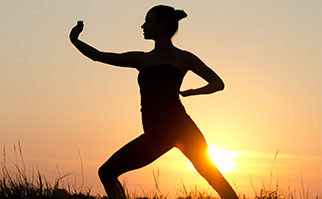
Tai chi and Qi Gong are mindful forms of exercise that are becoming more and more popular. They are gaining increasing recognition for their mental and physical health benefits, but they are still underrated as a fun route to health, fitness and happiness that works for all ages.
Lets have a look at some of the main reasons why you might think Tai chi and Qi Gong is not for you………….
- You think Tai chi is something Martial and you don’t fancy fighting.
- You think it is just for old people.
- You can’t commit to regular attendance, and you assume learning the ‘form’ requires you to come every week.
- You think it looks too easy / boring / slow and you prefer high impact sports.
- You don’t have time.
Well if that’s the case then you’d be wrong on every count!
Lets have a look at each one of these myths.
1. You think Tai Chi is something Martial and you don’t fancy fighting. Ok so Tai chi was originally a Martial Art, and there are classes where you can learn the martial application of Tai chi (which is actually great fun). But most people now practice Tai chi and Qi Gong for health. There is no martial training or fighting in my classes. We practice a series of standing and moving exercises to open up the body. They improve your posture, get your energy flowing more freely by clearing toxins and tensions, and calm the mind. Because of this, Tai chi and Qi Gong are great for tackling a wide range of mental and physical health problems. If you come to class you won’t have to touch anyone!
2. It’s just for old people. OK so you’ve seen pictures of older people doing Tai chi form in parks. But actually, just like swimming, walking, dancing or running, Tai chi and Qi Gong are for everyone. I’ve taught people of all ages from 4 – 94. Younger kids love the Animal exercises we do. These involve lots of jumping around. Adults of all ages enjoy the classes. They can be hard work. The exercises get you sweating and your energy flowing. You practice at your own level, so they are adaptable for all ages and abilities. The less mobile can even practice sitting down.
3. You can’t commit to regular attendance and learning the ‘form’ requires you to come every week. Those pictures of older people in parks again! Tai chi is often practised as a form, and I do teach the taiji 37 form, but this is only 1 way to practice. Actually, my teacher, Dr Shen Hongxun said that Tai chi is not form, form is a way to learn Tai chi principles, but it is not the only way. The exercises I teach from Dr Shen’s Tai chi and Qi Gong system (Taijiwuxigong) are individual standing and moving exercises that will help you to learn those principles, opening up the spine and all the joints, and clearing the body of tension, toxins and stress (or binqi). So you don’t need to come every week if time is an issue – bear in mind though that the more you put in, the more you get out.
4. You prefer high impact sports – this looks too easy / boring / slow. Actually Tai chi has recently been shown to have cardio benefits, so it is not necessary to do high impact sports to stay fit and have good heart health. It can also be hard work, and exercises every part of your body. Lots of people like higher impact exercise and team sports though, and Tai chi and Qi Gong can be a great compliment to those kinds of exercise. Because we are working on opening and clearing the joints and relaxing the muscles, it can be a great way to help heal sports and other injuries. Some people do struggle to slow down, but surprise themselves at how great they feel after a session working with the body’s energy and mind.
5. You don’t have time. Perhaps this is the most difficult myth to de-bunk! No-one really has time these days, and everyone’s lives are a bit crazy – but if you are living life at super speedy pace, then you are probably spending too much time on adrenaline. That means your sympathetic nervous system is too active and you are always in ‘fight or flight’ mode. Sooner or later it is likely you will crash. You may already be feeling the strain. Coming to class will give you some respite and help you manage your energy better. These exercises help to activate the parasympathetic nervous system ‘or rest and repair’ and bring your body back into balance. It’s like re-setting the clock. Each week at the end of class we also do a guided lying down meditation. As one Bristol University student said to me recently “This is my favourite 15 minutes of the week”.
A UWE staff member recently said: “I have found taking an hour out of the week for Tai Chi is a great way to do something new and allow my mind to regroup away from the desk – I recommend it!”
So how to do I start? If you want to come to class then have a look at my options for public classes. If these do not suit you, then there are other teachers in the Bristol area. Alternatively I would be happy to come to your workplace or run one or more sessions for a group or organisation you are involved with. Just send me an email on claire@taichibodyandmind.co.uk